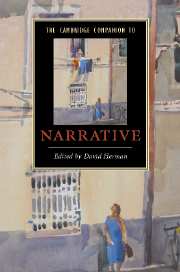Book contents
- Frontmatter
- Part I Preliminaries
- Part II Studying narrative fiction: a starter-kit
- Part III Other narrative media (a selection)
- Part IV Further contexts for narrative study
- 13 Gender
- 14 Rhetoric/ethics
- 15 Ideology
- 16 Language
- 17 Cognition, emotion, and consciousness
- 18 Identity/alterity
- Glossary
- Further reading
- Index
15 - Ideology
from Part IV - Further contexts for narrative study
Published online by Cambridge University Press: 28 September 2007
- Frontmatter
- Part I Preliminaries
- Part II Studying narrative fiction: a starter-kit
- Part III Other narrative media (a selection)
- Part IV Further contexts for narrative study
- 13 Gender
- 14 Rhetoric/ethics
- 15 Ideology
- 16 Language
- 17 Cognition, emotion, and consciousness
- 18 Identity/alterity
- Glossary
- Further reading
- Index
Summary
Ideology and narratology
Although early work in narratology focused mainly on the structures of stories rather than the contexts in which stories were told and interpreted, narrative theorists such as Roland Barthes indicated ways in which the study of narrative could be fruitfully combined with the study of the beliefs, norms, and values that constitute what has come to be termed ideology. For example, Barthes's 1966 essay “Introduction to the Structuralist Analysis of Narratives” pointed to the way a certain ideological conception of identity or personhood influenced previous understandings of the concept of “character” in narrative. Specifically, Barthes argued that a bourgeois conception of personhood had influenced literary critics to view characters as beings with a psychological essence rather than agents in narrated worlds that are defined by what they do or how they act. In this chapter, we extend Barthes's and others' suggestions to examine ways in which narrative procedures intersect with ideological issues. Building on the work of Karl Marx, Louis Althusser, and Antonio Gramsci, we define ideology as a body of norms and ideas that appear natural as a result of their continuous and mostly tacit promotion by the dominant forces in society. On the basis of this working definition, we investigate how research on stories can profit from greater attention to matters of ideology. Then we use F. Scott Fitzgerald's 1925 novel The Great Gatsby to show how the various connections between narrative and ideology can be developed in interpretation.
- Type
- Chapter
- Information
- The Cambridge Companion to Narrative , pp. 217 - 230Publisher: Cambridge University PressPrint publication year: 2007
- 17
- Cited by



